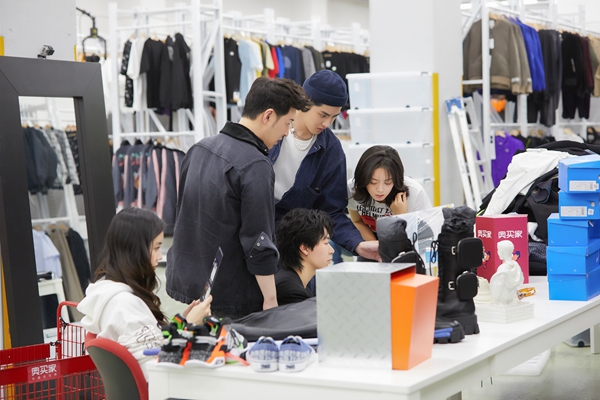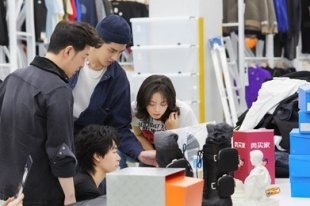Surprise in store for hip-hop stars


Kris Wu and Will Pan have gone from song sheets to tuning into business as the hip-hop stars attempt to cash in on their celebrity status.
Chinese-Canadian Wu and Chinese-American Pan established a bigger popular base among their growing number of fans when they participated as residing celebrity guests in the popular reality show Rap of China in 2017, which helped propel the hip-hop scene in the country to new heights. The two stars even saw their rap buzzwords gain common usage among their fans' daily dialogue, a sure sign of acceptance and fame.
But Wu and Pan branched out into the retail world as owners of a garment store, in a new reality show, Fourtry, that premiered on streaming media platform iQiyi this month.
The show highlights the challenges Wu, 29, and Pan, 39, face in their new role as entrepreneurs. For 20 days, they run a clothes store selling garments under the brand name Fourtry, in Harajuku, a leading business district in Tokyo, the capital of Japan.
This is not the champagne lifestyle of pop idols. Instead, they are just two retailers running a "down-to-earth" store, trying to sell their wares in a foreign country.
They were provided with an allowance of 300,000 yen ($2,738) to maintain the operation and feed themselves during the 20 days. They also have helping hands and other mouths to feed, namely those of their business partners, model-actress Angelababy (aka Yang Ying), rising rapper Hu Tianyu (stage name, Fox), and teen actress Zhao Jinmai (lead actress in The Wandering Earth). Each has less than $28 to spend per day on business and living for the allocated 20 days.
"It would be meaningless if Kris Wu and Will Pan opened a store in China for our show," Che Che, director of the program, says as he explains the choice of Tokyo for the show. "If they ran a store in China, and sold clothes that just copy what's in their own wardrobes, the store would be emptied in a day by their fans before they gained any valuable retail experience.
"In Tokyo, people pursuing pop culture brands will be picky," Che says. "We wanted them to be under real pressure."
Though clothes are provided to the five stars "for free" by sponsors of the show, the challenge is real. They have to take care of logistics and marketing by themselves. For 17-year-old Zhao, the first day in Japan began with getting immersed in the warehouse selecting goods and moving the freight to the store.
"I have to say it's different from what I expected," the actress states.
Che monitors their progress from a nearby cafe but crucially does not intervene.
"I don't have any particular methodology to follow during filming," says the director. "We've provided them a warehouse, a minivan and a store, and we let them take care of the rest by themselves."
As seen in the show, the general public can be hard to please and celebrity status is no guarantee of sales, but hard work can pay dividends. After twists and turns, Lady Luck finally smiles on them. When customers, both Chinese and locals, begin to visit the store in droves, all the effort and dedication pays off.
"We tend to present our 'cool' side at our concerts or onscreen," Pan says. "But Fourtry gives us an opportunity to show another side of our personalities."
Che explains the production team's purpose for making the show. "We just want to bring so-called 'high-end fashion' down to earth and entertain the general public," he says.
Indeed, viewers were entertained. One wrote on TV and film review website Douban.com: "I really appreciate that the production team didn't deliberately create a so-called 'battle' in the show-these stars did not get aggressive toward each other. They didn't build up their 'highlighted images' or try to stand out from the team. They seemed to enjoy their work in a good atmosphere and completed it well."
While watching the show, viewers are able to order products online from Fourtry. Though the store in Tokyo closed after filming of the program finished, other stores are scheduled to be opened in Beijing and Shanghai.
Fads in the Chinese fashion industry are often led by overseas brands and Che understands the significance of this program in enabling original Chinese designs to be better promoted. "When selling Chinese designs in Harajuku, a hub of street fashion, your products cannot copy others. Frankly speaking, these stars don't know that much about the latest design trends in the Chinese fashion industry.
"However, when promoting 'Chinese style' in Tokyo, the show led us, and them, to keep learning."





































